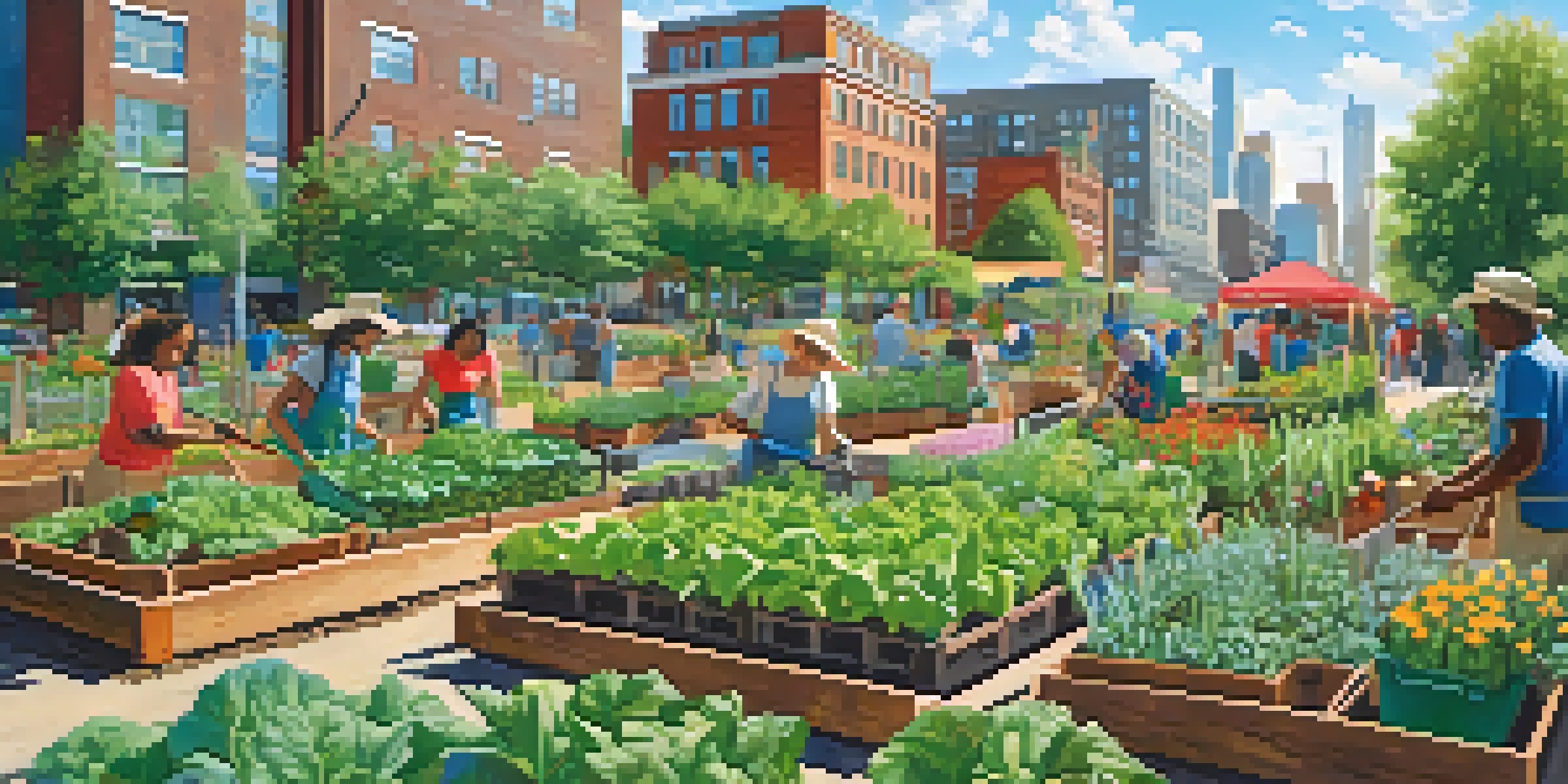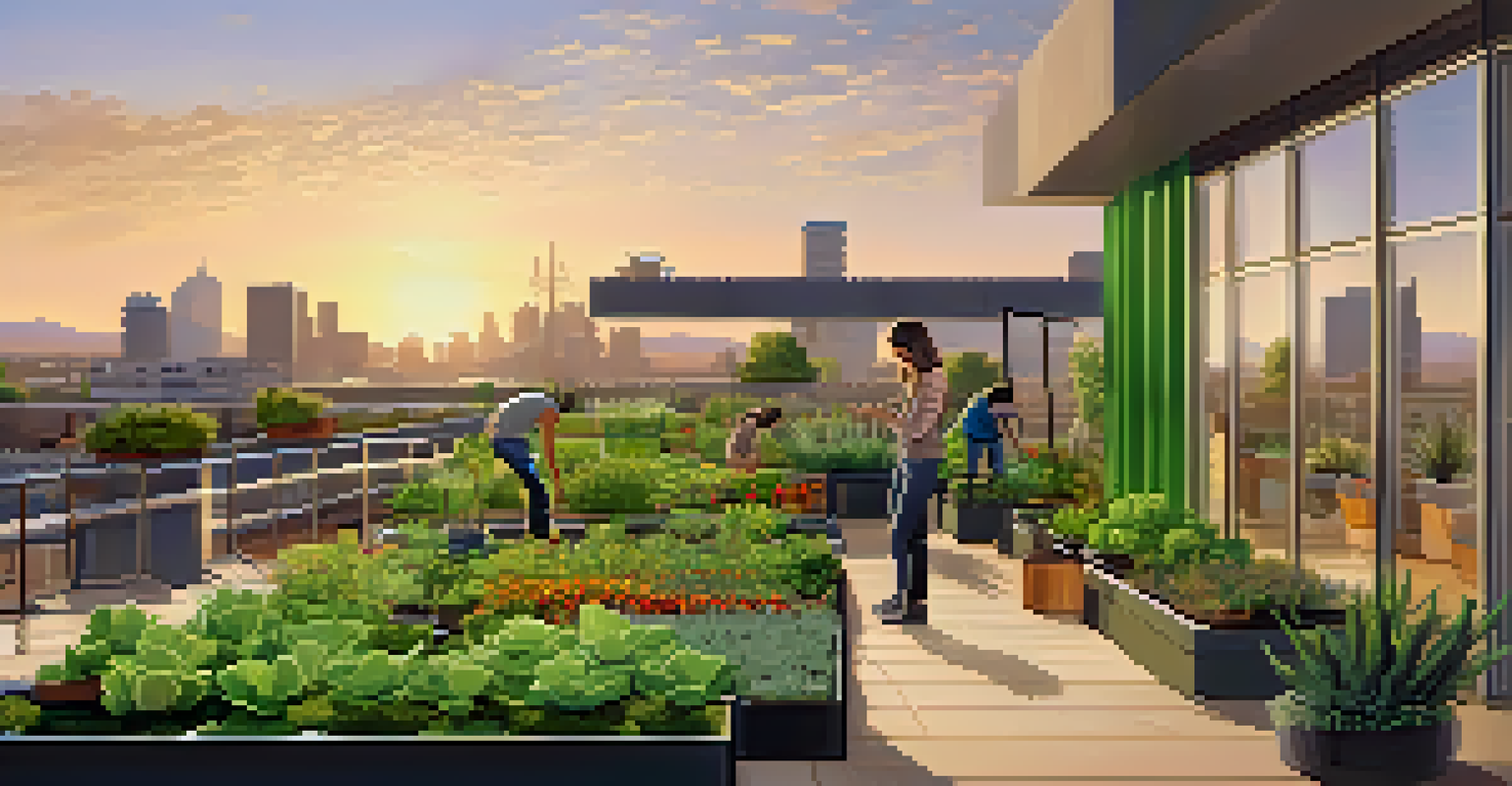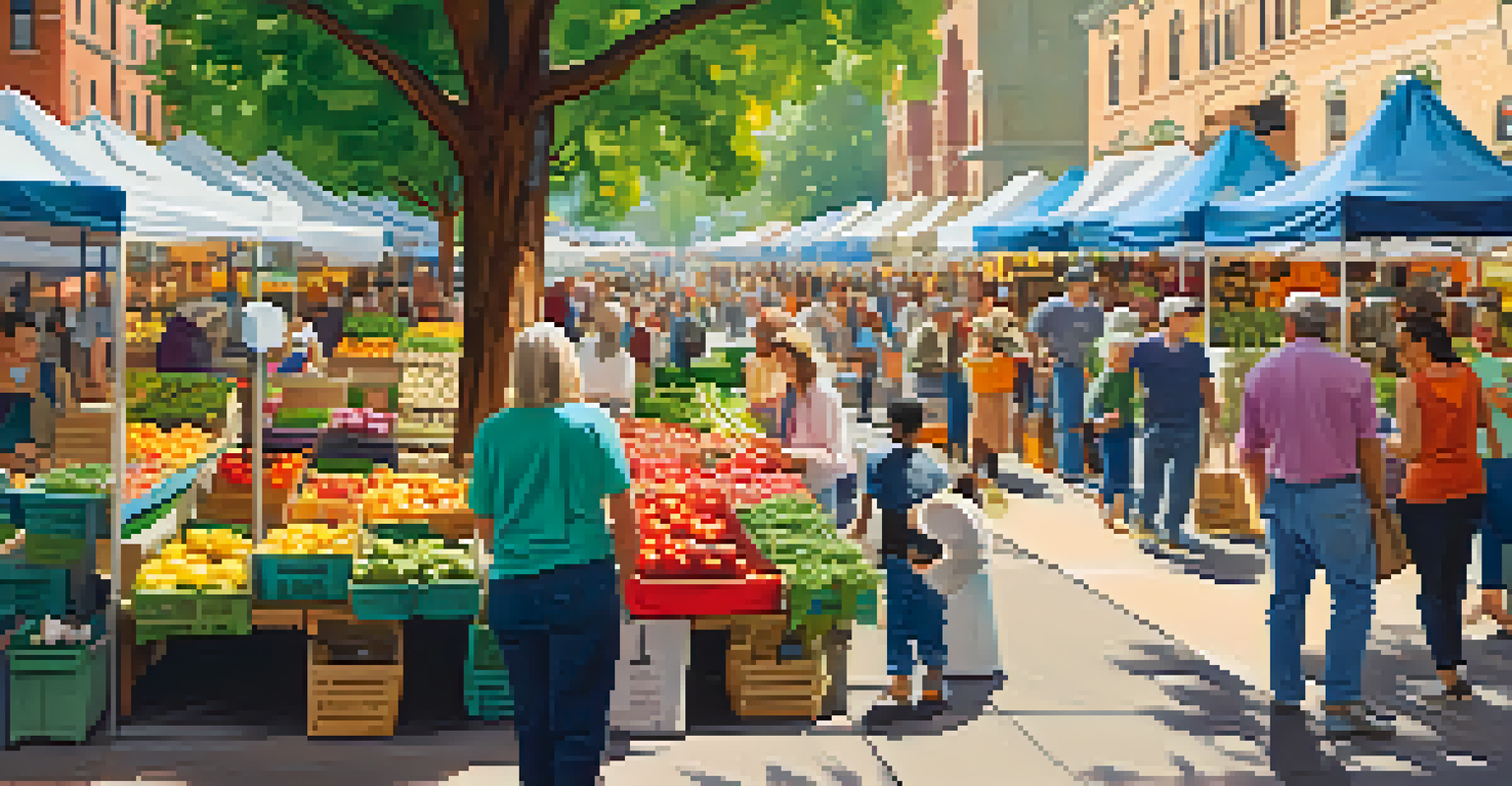The Impact of Urban Agriculture on Phoenix's Food Security

Understanding Urban Agriculture and Its Importance
Urban agriculture refers to the cultivation of, processing, and distribution of food in or around urban areas. This concept not only promotes local food production but also enhances community engagement and sustainability. In cities like Phoenix, where traditional farming is limited by space and climate, urban agriculture provides a vital solution to food challenges.
Urban agriculture is not just about growing food, it's about growing community.
The importance of urban agriculture extends beyond just food production—it contributes to environmental health. By utilizing vacant lots, rooftops, and community gardens, cities can promote biodiversity and reduce urban heat. This transformation of urban spaces into green areas fosters a sense of community and connection to the food system.
Moreover, urban agriculture can help combat food deserts, areas with limited access to affordable and nutritious food. By growing food locally, communities can ensure that fresh produce is available to those who need it most, bridging the gap between food access and health.
Phoenix's Unique Food Security Challenges
Phoenix faces significant challenges in food security due to its rapid population growth and arid climate. The city has a high rate of food insecurity, meaning many residents lack reliable access to sufficient, affordable, and nutritious food. This situation is exacerbated by limited transportation options and socioeconomic disparities.

Additionally, the extreme heat in Phoenix can hinder traditional agriculture practices, making it difficult for farmers to produce crops year-round. This climate challenge highlights the need for innovative solutions, such as urban farming, which can utilize microclimates and water-efficient practices to grow food even in harsh conditions.
Urban Agriculture Enhances Community
Urban agriculture fosters community connections, reduces food deserts, and promotes sustainability in urban settings.
As the population continues to grow, addressing these challenges becomes increasingly urgent. Urban agriculture presents a viable strategy to enhance food security by producing fresh food closer to where people live, thereby reducing transportation costs and ensuring availability.
Benefits of Urban Agriculture for Communities
Urban agriculture offers a wealth of benefits that extend beyond providing fresh food. It fosters community connections by bringing people together to work towards a common goal—growing food. This collaboration helps build social networks, reduces isolation, and strengthens community ties.
The future of food is in our cities, where we can cultivate not only crops but also connections between people.
Moreover, gardening and farming can have significant mental health benefits. Engaging in outdoor activities, especially in green spaces, has been shown to reduce stress and improve overall well-being. In a bustling city like Phoenix, urban farms can serve as peaceful retreats for residents, promoting a sense of tranquility amidst the urban chaos.
Additionally, urban agriculture can serve as an educational platform, teaching residents about nutrition, sustainability, and food systems. By involving schools and community organizations, urban farms can empower individuals with knowledge, encouraging healthier eating habits and greater environmental stewardship.
Innovative Urban Farming Techniques in Phoenix
Phoenix has embraced a variety of innovative urban farming techniques to adapt to its unique environment. Techniques such as vertical farming and hydroponics allow for food production in limited spaces and can significantly reduce water usage, which is crucial in a desert climate. These methods maximize yield while minimizing resource consumption.
Community gardens are also gaining popularity throughout the city, allowing residents to cultivate their own plots. These gardens not only produce food but also create green spaces that enhance urban aesthetics and biodiversity. They can also be a source of pride and identity for neighborhoods, encouraging stewardship of shared resources.
Phoenix Faces Food Security Issues
Rapid population growth and arid climate in Phoenix contribute to significant food insecurity challenges for residents.
Furthermore, initiatives like rooftop gardens on commercial buildings help utilize otherwise wasted space. By converting rooftops into productive gardens, businesses can contribute to local food systems while also improving building energy efficiency through natural insulation.
Local Government Support for Urban Agriculture
The city of Phoenix recognizes the importance of urban agriculture and has begun implementing supportive policies. Local government initiatives aim to promote food production in urban settings by providing resources and incentives for community gardens and urban farms. This support helps create a more resilient food system.
Additionally, zoning laws are being adjusted to encourage urban farming, allowing for greater flexibility in land use. By simplifying the process for establishing community gardens and urban farms, the city is fostering a culture of local food production. This proactive approach is crucial for addressing food insecurity effectively.
Moreover, partnerships between city officials and local organizations have led to educational programs that empower residents to start their own urban farms. These initiatives not only provide training but also create networks of support, ensuring that urban agriculture can flourish in Phoenix.
Community Engagement and Urban Agriculture
Community involvement is essential for the success of urban agriculture initiatives. Engaging residents in the planning and maintenance of community gardens fosters a sense of ownership and responsibility. This involvement also ensures that the food produced aligns with the needs and preferences of the community.
Events such as workshops, farm-to-table dinners, and volunteer days create opportunities for residents to connect and learn about sustainable practices. These gatherings not only promote healthy eating but also build relationships among neighbors, enhancing community cohesion.
Innovative Farming Techniques Thrive
Techniques like vertical farming and hydroponics allow Phoenix to produce food efficiently despite limited space and resources.
Additionally, local schools are increasingly incorporating urban agriculture into their curricula, teaching students about where their food comes from. By involving young people in gardening and farming activities, they develop a deeper appreciation for food systems and the environment.
The Future of Urban Agriculture in Phoenix
As Phoenix continues to grow, the future of urban agriculture looks promising. With ongoing support from local government and community organizations, more residents are likely to get involved in food production initiatives. This engagement will help build a more sustainable and resilient food system in the city.
Innovations in technology and farming practices will also play a significant role in shaping urban agriculture. As methods become more efficient and resource-conscious, urban farms can produce more food with less impact on the environment. This shift is crucial for addressing the challenges posed by climate change and urbanization.

Ultimately, the success of urban agriculture in Phoenix will depend on continued collaboration among residents, local organizations, and government entities. By working together, they can create a food system that not only meets the needs of the community but also nurtures the environment and fosters social connections.